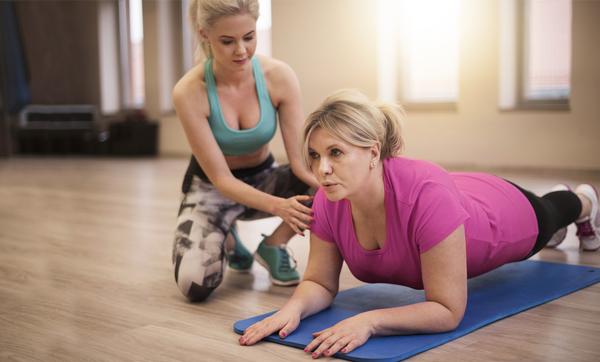 SELECTED
ISSUE
SELECTED
ISSUE
|
|
Leisure Management - Excessive exercisers

Ask an expert

|
|
| Excessive exercisers
|

With physical inactivity at worringly high levels, committed gym members are to be applauded. But how should operators respond when members appear to be exercising excessively? Kath Hudson asks the experts if it’s best to turn a blind eye or to intervene
|


Regularly exercising beyond exhaustion can have a negative impact on the body Photo: SHUTTERSTOCK.COM
|
|
|
Research has long shown that exercise has a wide range of benefits and can improve some conditions, such as depression and high blood pressure, more effectively than medication. Furthermore, many people successfully use sport and exercise as a positive tool to deal with grief, loneliness, divorce and other major life changes. However, exercise can become addictive and have a negative impact on a person’s body, health and life if carried out excessively. Writing in the British Medical Journal, physiologist Dr Cathy Zanker, who has obsessive compulsive disorder (OCD), said that her condition drove her to work out in a very precise manner every day: the same treadmill, same cycle ergometer, same spot in the pool, come what may and to the point of exhaustion. With four degrees in biomedical science, she was aware that she was overexercising, but she was also fighting the “punishing voices” of OCD and anorexia nervosa. Overexercising and undereating frequently thrive off one another, especially if someone is using exercise to burn lots of calories or achieve a specific weight. However, this is common practice among elite athletes. Speaking in the June issue of Health Club Management, former international rower, Zac Purchase, said that in order to maintain his race weight he was restricted to just 1,000 to 1,500 calories a day, despite training intensely for four or five hours each day. Few operators would intervene if Zac Purchase was training tirelessly in their gym. But what if a member of the public is using your gym multiple times a day, has lost visible amounts of weight and/or seems to be punishing themselves through exercise? Legally, gym staff are not obliged to intervene if they think someone is overexercising or has an eating disorder, but do operators have a moral duty of care? And if you do choose to broach this difficult subject, which team member should do it and how?
|
|
 |

Sol Gilbert
Owner
Underground Gym
 |
|
As a gym owner, I feel it’s a matter of ethics to intervene if I think someone is endangering their health by overexercising, undereating or performing an exercise badly. We’re in the health business and I pride myself on ensuring people do things effectively. However, if an intervention is made it needs to be from someone in authority, or a PT who is working with the client.
Some of my members come to the gym twice a day. They do cardio in the morning and resistance training in the evening. So they are training a lot and there is a correlation between overtraining and undereating. However, it’s a tricky one because a lot of elite athletes do the same, and some of my overtraining members are sports-specific athletes.
I spend a lot of time on the gym floor, to gauge what is happening. If I suspect people are showing unhealthy behaviours, I will approach them and ask questions about what they're doing, but in a friendly way. I’ll base my advice on research and science about the importance of rest, recovery and good nutrition.
People generally don’t welcome the intervention, which is why you have to know your science. Occasionally I have had to tell them that I’m going to restrict them to one session a day. If they don’t take my advice I will ask them to find another a gym that has a more relaxed approach.
I once had a member with a severe weight disorder, who was very frail. I engaged her in conversation and told her how many calories she should be eating. She didn’t react well and I had to remind her that I was coming from a good place, rather than a negative one. I referred her back to the doctor and said I would need a doctor’s report if she was going to continue coming to the gym. She stopped coming.
I’m aware that dealing with eating disorders is beyond my professional capabilities, so I’m a big believer in referring on and telling people to seek appropriate professional advice. I’m aware I can’t cure them, but from a moral standpoint, I won’t enable their behaviour in my gym.
"I have had to tell overexercisers that I’m going to restrict them to one session a day and if they don’t take my advice I will ask them to find another a gym that has a more relaxed approach"
| |


|
| Photo: SHUTTERSTOCK.COM |

Some highly motivated gym-goers may push themselves too hard |
|
|
 |

Dr Carl Lavie
Medical director of cardiac rehabilitation and preventative cardiology
John Ochsner Heart and Vascular Institute
 |
|
As a doctor, I don’t think it's appropriate for a gym professional to intervene by offering advice where it hasn't been requested, unless the individual concerned is placing others at risk or having an acute medical emergency. However, if the person is working with a PT, they have contracted their services and are seeking their advice. In this scenario, I think it's appropriate to intervene.
If symptoms are acute this could call for a medical intervention or advising the person to see a physician for sub-acute symptoms. The PT may also talk to the individual about reducing their training time and intensity to lessen the potential harm that could come from overtraining – either for health reasons or to improve performance.
There is considerable scientific debate regarding the risks of overexercising, and although these risks are relatively small, I still believe there are risks, especially of developing atrial fibrillation. However, the risks of heart attack and dying are relatively low, so I don’t tell patients that they have to cut down. Instead I explain the pros and cons of higher versus lower doses of exercise.
I try to emphasise that the maximum health benefits of exercise are typically achieved at quite low levels, so large amounts of exercise are not needed for good health. Of course, most people who do very high levels of exercise do so for non-health reasons, including competition, ego, fun, stress relief and friendships.
"If the person is working with a PT, they have contracted their services and are seeking their advice. In this scenario, I think it's appropriate to intervene"
| |


|
| Photo: SHUTTERSTOCK.COM |

PTs can advise clients on the role of rest and recovery in an effective exercise regime |
|
|
 |

Deanne Jade
Founder
National Centre for Eating Disorders
 |
|
It’s very difficult for gyms to intervene in the case of an eating disorder for a number of reasons. If someone is suffering from bulimia or compulsive eating, this is not always apparent. And if they think someone is undereating this involves making a judgement about their size. Furthermore, most gym staff don’t have any knowledge of eating disorders and are therefore unqualified to intervene.
The most far reaching thing a gym could do is to write into their mission statement and contracts that they have a right to intervene if they have a concern about someone’s health. This would make it easy to raise issues and have a friendly chat, although it could deter potential members from joining a gym.
It would also be very useful to have literature, like posters and leaflets around, regarding eating disorders and to hold awareness raising talks. I would love all gym staff to be trained in the psychology of eating disorders, body image and exercise addiction, because gyms often have many people suffering from these illnesses as their members. Failing this, it would be great if a member of staff could call a hotline or signpost gym-goers to an expert if they have a concern.
Gyms also need to think about their own marketing material. Always using thin, lycra-clad people in promotional pictures and videos can be alienating and doesn’t encourage people to make peace with themselves and food.
"I would love all gym staff to be trained in the psychology of eating disorders and exercise addiction"
|
|
 |

Matt Sanderson
Co-founder
Triathlon Coach UK
 |
|
As a former health club owner and now a specialist triathlon coach, I have frequently seen both clients and members of staff show traits of overtraining and undereating. The easiest thing is to turn a blind eye, because people don’t like to be challenged; however, from a moral point of view, I'm not able to do this.
If you do decide to intervene, it’s important to have a private conversation with the person, and you need to be prepared to receive a negative reaction and potentially lose the member or the employee. It isn’t easy, but that’s better than seeing someone put their health at risk.
As a triathlon coach, where people are specifically paying for advice on training and nutrition, it is much easier to broach the subject and for them to accept it. Our clients are all amateur triathletes with similar characteristics: responsible jobs, partners and families, high achieving and often analytical about data. Triathlon is an absorbing sport and it can bring out negative, compulsive behaviours, such as putting too much scrutiny on nutrition to achieve race weight, or feelings of guilt if they miss a session followed by playing catch up and then overdoing it. Our athletes keep food and training diaries, which show that some have to train at 4.45am, before going to work from 7am to 6pm and then training again in the evening. While this is possible on occasion, if done regularly, it often leads to overtraining as recovery time is reduced.
Fortunately, we usually have some stats to back up our comments – we can look at the client's performance as training sessions are automatically uploaded from their Garmin device. This provides detail on heart rate, power and training time. We also commonly want to know additional data on their sleeping patterns. If there are noticeable changes, we directly tell the person that he or she needs more rest or to eat more nutritious food.
Our clients like the structure that triathlon and training gives them, and they feel fantastic when they are race fit. However, we always encourage them to back right off for at least one month a year – they can run, but leave the Garmin at home and they can have bike rides for fun with the slow friend who they drop when they’re in serious training! ,null
"If you do decide to intervene, it’s important to have a private conversation, and you need to be prepared
to receive a negative reaction"
| |


|
| Photo: SHUTTERSTOCK.COM |

A private and friendly conversation is best when discussing overexercising |
|
|
 |
| Originally published in Health Club Management 2017 issue 11
|
|
 |
|